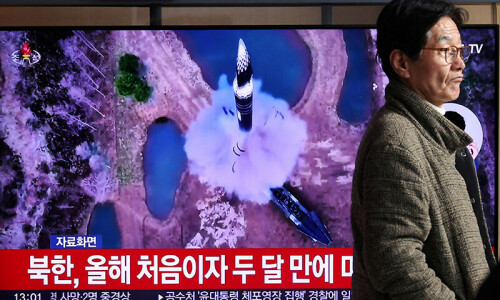MOSCOW, July 27: Russia announced plans on Sunday to revive its once-mighty navy by building several aircraft carriers and upgrading its fleet of nuclear submarines in the coming years.
Russia’s power at sea is a shadow of the formidable Soviet navy which challenged US military dominance in the Cold War.
But, with a strong economy now from booming oil exports, it is seeking to raise its profile on the world stage by modernising the armed forces.
Russia will build five or six aircraft carrier battle groups in the near future, RIA news agency quoted Navy Commander Vladimir Vysotsky as telling Navy Day festivities in St Petersburg, the second city.
“We call this a sea-borne aircraft carrier system which will be based on the Northern and Pacific fleets,” Vysotsky said.
“The creation of such systems will begin after 2012.”
He said such carrier groups would operate in close contact with Russia’s military satellites, air forces and air defences.
Russia now has only one aircraft carrier, the Soviet-built Nikolai Kuznetsov, which was launched in 1985 but did not become fully operational for 10 years due to the turmoil following the Soviet Union’s collapse in 1991.
In fact, it is not even a fully-fledged aircraft-carrier, being officially called an air-capable cruiser. It carries fewer aircraft than US carriers and features a steam-turbine power-plant with turbo-generators and diesel generators, while all modern carriers are nuclear-powered.
Vysotsky said that along with designing new aircraft carriers Russia would also modernise its new-generation nuclear submarines of the Borei class (Arctic Wind).
The first Borei submarine of the so-called “Project 955”, the Yuri Dolgoruky, was launched in February and is expected to be fully operational by the end of 2008. Two other submarines of this class are now being built.
“Starting with the fourth submarine, we will begin modernising this class,” Vysotsky said. “The modernised Borei submarines will be the core of Russian naval nuclear forces until 2040.”
“We are aspiring not only to introduce new technologies, not only to compete with the West, but to take completely new steps which would allow us to look at submarine technologies of the middle of the 21st century,” he said.
The prestige of Russia’s navy was badly dented in August 2000 when the Kursk nuclear submarine, one of its newest, sank in the Barents Sea, with the loss of all the 118 sailors on board.
Tests of a new nuclear intercontinental ballistic missile Bulava-M, designed to be mounted on Borei-class submarines, have been a mixture of failure and success. The Kremlin has touted Bulava as a unique weapon able to pierce any air defence.
Vysotsky said Bulava would come into service this year.
“Despite the fact that there are still some glitches, the missile will all the same learn how to fly,” he said. “Not just to fly, but also to use all the potential invested in it.” —Reuters















































Dear visitor, the comments section is undergoing an overhaul and will return soon.